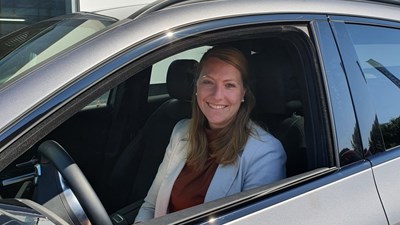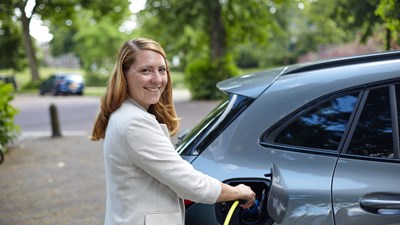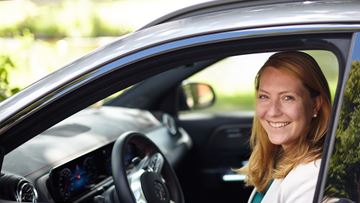“Be prepared to change your mindset and plan ahead – and driving will be more fun than ever.”
In 2025, Athlon plans to be fully electric: every car driven by employees will be an e-vehicle (EV). Business development manager Nicola Jenne – ‘Nicki’ to her friends – didn’t wait that long to decide on her EV. She was incredibly excited to take the wheel of her electric Mercedes EQA 250 but then ‘range anxiety’ reared its head. The good thing: the fear of running out of juice disappeared as quickly as snow on a sunny day.
Nicki, who’s responsible for business development at Athlon International, is an adept traveler. Born and raised in Germany, she’s been living in the Netherlands for several years, from where she crisscrosses Europe to visit colleagues and customers.
When she’s not traveling for Athlon, she loves hopping in her car on a Friday night and driving off for a spontaneous city trip, to Paris or elsewhere, or to visit friends in Germany. Planning didn't play a big role when it came to her leisure time activities. How does that work when driving an e-vehicle?
What made you choose an electric vehicle?
Nicki: “Well, my travel behavior to start with. I tend to do a lot of kilometers each week, both for work and to visit family and friends all over the Netherlands and Germany. I was bothered by the impact this was having on the environment, so couldn’t wait to lower my carbon footprint and drive emission-free. That matches the vision of Athlon perfectly. We’ve been raising awareness about the importance of e-vehicles for many years now and it seemed only logical to practice what we preach.”
“I was bothered by the impact my travels were having on the environment, so couldn’t wait to lower my carbon footprint and drive emission-free.”
So, how did it feel to take the wheel of your electric Mercedes?
Nicki: “I couldn’t wait to get my hands on the keys. In fact, I’m a bit of a car freak, I love driving, and I had heard that EVs provide an outstanding driving experience: they are fast and fun and comfortable. And that was true. With no engine vibration or noise, driving is lovely and smooth.
Still, I had to get used to the fact that charging an EV takes more than five minutes. And then came the first long-distance trip. Driving to Paris took me 10 hours instead of 5 and I was really anxious that I would run out of power. Fortunately, I was able to call a colleague for advice and this has helped me get more comfortable with electric driving.”

What advice did you get that made you change your perception?
Nicki: “I understood that I had to change my mindset. To be honest: I wasn’t really prepared for the switch to electric – I don’t really like to plan ahead, remember. So, during my first long trip, I was using five different apps to locate an EV charging station. Then I learned that the navigation system that’s embedded in my Mercedes actually plans the charging itself, so you simply have to follow the system to the next charging station. In addition, Ronald van Slooten, our International Business Owner e-Mobility, told me to charge whenever I could, rather than waiting until I was running out of battery. Just like you plug in your smartphone every day.”
So, it’s really a change of mindset?
Nicki: “Absolutely. When I go on a long-distance trip now, I simply add the charging time to the travel time – and it doesn’t bother me at all. I never have thought I would say this, but I’ve actually become more organized and relaxed, and take regular breaks on long trips!”
“Charge whenever you can, rather than waiting until you are running out of battery. Just like you plug in your smartphone every day.”
What is your charging routine in a normal working week?
Nicki: “The Athlon office in Almere is a 50-km drive, one way, and we’re aiming to set an example with EV charging stations there. I plug in the car as soon as I arrive in the morning. Still, Athlon is investing heavily in charging infrastructure, and installing more stations on every company site. For now, I leave a note with my phone number on my car windscreen, so that colleagues can let me know if they want to charge their vehicle. Not that anyone has called me, but still, it’s not a bad idea, right?”
What about charging at home?
Nicki: “I can’t, as I live in an apartment, yet the Netherlands is a great country for EV drivers. When I got my car in January, there were two charging stations in our street. Just three months later, there were four. So, if I don’t go to the office, I can always load the battery close to home. Still, let me get this straight: the infrastructure really is at different maturity levels in Europe. I hope that will change fast.”
What tips would you give to fleet managers who want to convince their colleagues to switch over to an EV?
Nicki: “I’d recommend giving as much practical information on electric driving in advance as possible. Like I explained, I opened the door of my electric Mercedes and drove off without the slightest knowledge of electric vehicles. For example, I was unaware that cold weather drastically reduces the EV battery range.

That would have been handy to know, as I started driving my electric Mercedes in January. The issues that I had with all the different apps could have been avoided too. And when ordering my EV I was asked whether I wanted a 4-meter or an 8-meter charging cable. I chose the shortest one, which appeared not to be the best choice, as an electric Mercedes has the charging in the rear. These may all be minor details, but having all this knowledge in advance would have improved my EV experience in the early days.
Now, I know why a question on the length of a charging cable is important to have a good customer experience and can attest that Athlon knows what is helpful for the driver.
In addition, I’d recommend fleet managers to offer a flexible mobility package that includes a fuel-based car for really long-distance trips to countries where the charging facilities are lagging behind. Employees could then swap their EV for a larger, fuel-based alternative for their annual holidays, for example. This use case of an EV can often be suitable, and if not, we have flex products like rental.”
Can Athlon help speed up adoption?
Nicki: “Definitely. Driving electric is a step-change difference. We have to ensure a smooth onboarding and act as a ‘facilitator’, providing assistance to new drivers. In this way, we can reduce issues like range anxiety from the very first moment.”
In summary: in spite of your original hurdles, you’ve become a fan of electric vehicles?
Nicki: “Absolutely, you don’t have to make any compromise when driving an EV. On the contrary, traveling has become more fun and more relaxing. Just make sure that you’re well prepared and you’re bound to enjoy a fantastic driving experience.”

